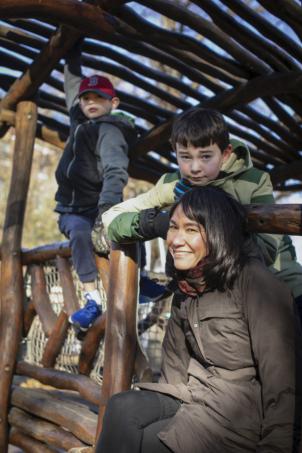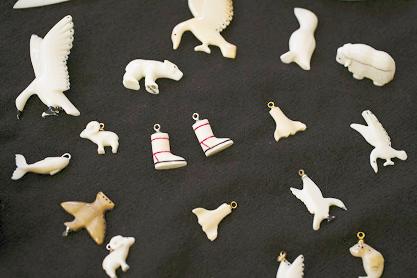 |
Canku Ota
|
 |
|
(Many Paths)
|
||
|
An Online Newsletter
Celebrating Native America
|
||
|
February 2020 - Volume
18 Number 2
|
||
|
|
||
|
"Being Attentive
To Loss Doesn't Have To Be Devastating."
|
||
|
by Joan Naviyuk Kane,
Harvard College
|
||
|
Joan Naviyuk Kane,
Alaska
Portrait Kane relates to her grandmother's tough times and challenges. No corner of the world was remote enough to escape the horrific flu pandemic of 1918. For Kane's grandmother and her sisters, the death of their parents at that time meant traveling on foot from Mary's Igloo, Alaska, their remote Inupiaq reindeer hunting camp on the Seward Peninsula, to a Catholic mission 20 miles away. "I think they were 2, 4, and 6 when my grandmother and her older sister switched off carrying their younger sister along the Pilgrim and Kuzitrin Rivers," said Kane. "They thought that the way to survive was to get to where there might still be people living, and they knew there was a church or mission at this hot-springs location."
The orphaned sisters were raised by the mission's Ursuline nuns, who taught them English, French, and Latin. But through that process, they and other Alaskan Native survivors of the pandemic remained dedicated to speaking their first language, the Qawiaraq dialect of Inupiaq. "This is at a time when many Native people were physically beaten, even in American schools … for speaking anything other than English," said Kane. But "through this experience of having learned a number of languages, she was able to instill in King Islanders of my mother's generation a real pride in the [Inupiaq] language," said Kane. "She insisted that King Islanders keep our language alive, and … use it … to connect with others." That care and attention to culture and language carried through the following generations of Kane's family, down to her own children. Kane returned to her alma mater this fall as a Hilles Bush Fellow at the Radcliffe Institute for Advanced Study, and while back in Cambridge she is expanding her written work beyond poetry in a collection of essays exploring themes of indigeneity, gender, and motherhood. Kane believes that exposing people to written Inupiaq is essential to the language's depth and influence. Her poems are written in both Inupiaq and English, and her family owns the only known written dictionaries of the dialect, which her older son is working to digitize so they can be shared within their community and far beyond. "King Island Inupiaq is predominantly a spoken language, and I have found as I've developed in my career as a writer and as a teacher that I really have a responsibility to use the language as a written language," said Kane. "Because there are so few in-person speakers of the dialect alive, the written language can extend and reach far more people than our spoken language can." Today, there are between 100 and 150 primary speakers of Inupiaq remaining, a number that Kane hopes will grow through carrying on and spreading her grandmother's practice of teaching the language. "When [a] language is lost, when a word … is no longer spoken or invoked or used or remembered, in some ways that is irrecoverable," said Kane. "That said, there are so many ways to reconstruct what's lost, and I think being attentive to loss doesn't have to be devastating. It can really inform people to take action and to participate — not just keep [something] alive, but actually think about the capacity of the human imagination … to create something new." ABOUT JOAN NAVIYUK KANE MORE LINKS |
|||||||||
|
|
|
|
||
|
|
||
| Canku Ota is a free Newsletter celebrating Native America, its traditions and accomplishments . We do not provide subscriber or visitor names to anyone. Some articles presented in Canku Ota may contain copyright material. We have received appropriate permissions for republishing any articles. Material appearing here is distributed without profit or monetary gain to those who have expressed an interest. This is in accordance with Title 17 U.S.C. Section 107. | ||
|
Canku Ota is a copyright ©
2000 - 2020 of Vicki Williams Barry and Paul Barry.
|
||
 |
 |
|
|
The "Canku
Ota - A Newsletter Celebrating Native America" web site and
its design is the
|
||
|
Copyright ©
1999 - 2020 of Paul C. Barry.
|
||
|
All Rights Reserved.
|
||

